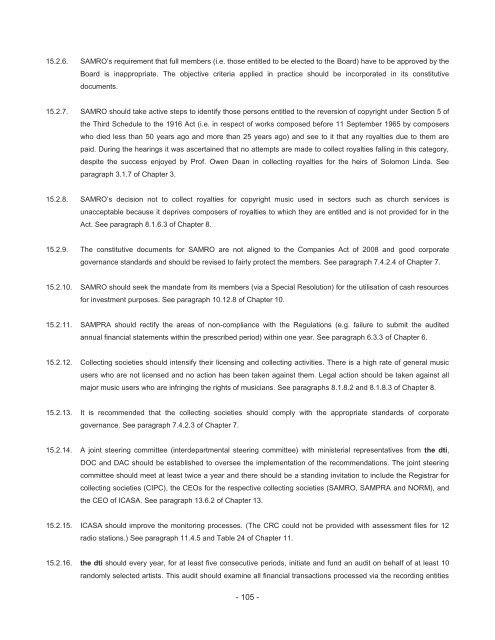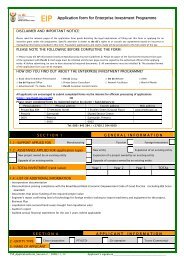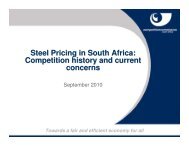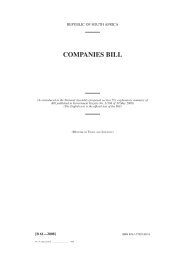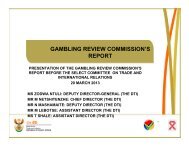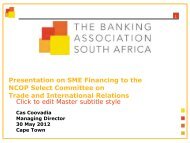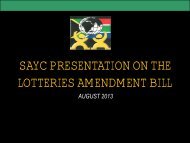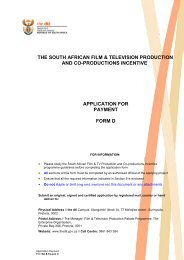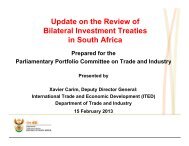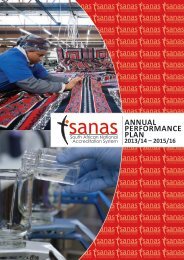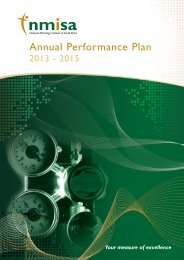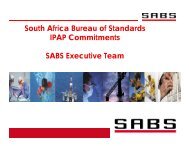Copyright Review Commission Report - ICT Law and Regulation ...
Copyright Review Commission Report - ICT Law and Regulation ...
Copyright Review Commission Report - ICT Law and Regulation ...
- No tags were found...
Create successful ePaper yourself
Turn your PDF publications into a flip-book with our unique Google optimized e-Paper software.
15.2.6. SAMRO’s requirement that full members (i.e. those entitled to be elected to the Board) have to be approved by theBoard is inappropriate. The objective criteria applied in practice should be incorporated in its constitutivedocuments.15.2.7. SAMRO should take active steps to identify those persons entitled to the reversion of copyright under Section 5 ofthe Third Schedule to the 1916 Act (i.e. in respect of works composed before 11 September 1965 by composerswho died less than 50 years ago <strong>and</strong> more than 25 years ago) <strong>and</strong> see to it that any royalties due to them arepaid. During the hearings it was ascertained that no attempts are made to collect royalties falling in this category,despite the success enjoyed by Prof. Owen Dean in collecting royalties for the heirs of Solomon Linda. Seeparagraph 3.1.7 of Chapter 3.15.2.8. SAMRO’s decision not to collect royalties for copyright music used in sectors such as church services isunacceptable because it deprives composers of royalties to which they are entitled <strong>and</strong> is not provided for in theAct. See paragraph 8.1.6.3 of Chapter 8.15.2.9. The constitutive documents for SAMRO are not aligned to the Companies Act of 2008 <strong>and</strong> good corporategovernance st<strong>and</strong>ards <strong>and</strong> should be revised to fairly protect the members. See paragraph 7.4.2.4 of Chapter 7.15.2.10. SAMRO should seek the m<strong>and</strong>ate from its members (via a Special Resolution) for the utilisation of cash resourcesfor investment purposes. See paragraph 10.12.8 of Chapter 10.15.2.11. SAMPRA should rectify the areas of non-compliance with the <strong>Regulation</strong>s (e.g. failure to submit the auditedannual financial statements within the prescribed period) within one year. See paragraph 6.3.3 of Chapter 6.15.2.12. Collecting societies should intensify their licensing <strong>and</strong> collecting activities. There is a high rate of general musicusers who are not licensed <strong>and</strong> no action has been taken against them. Legal action should be taken against allmajor music users who are infringing the rights of musicians. See paragraphs 8.1.8.2 <strong>and</strong> 8.1.8.3 of Chapter 8.15.2.13. It is recommended that the collecting societies should comply with the appropriate st<strong>and</strong>ards of corporategovernance. See paragraph 7.4.2.3 of Chapter 7.15.2.14. A joint steering committee (interdepartmental steering committee) with ministerial representatives from the dti,DOC <strong>and</strong> DAC should be established to oversee the implementation of the recommendations. The joint steeringcommittee should meet at least twice a year <strong>and</strong> there should be a st<strong>and</strong>ing invitation to include the Registrar forcollecting societies (CIPC), the CEOs for the respective collecting societies (SAMRO, SAMPRA <strong>and</strong> NORM), <strong>and</strong>the CEO of ICASA. See paragraph 13.6.2 of Chapter 13.15.2.15. ICASA should improve the monitoring processes. (The CRC could not be provided with assessment files for 12radio stations.) See paragraph 11.4.5 <strong>and</strong> Table 24 of Chapter 11.15.2.16. the dti should every year, for at least five consecutive periods, initiate <strong>and</strong> fund an audit on behalf of at least 10r<strong>and</strong>omly selected artists. This audit should examine all financial transactions processed via the recording entities- 105 -


